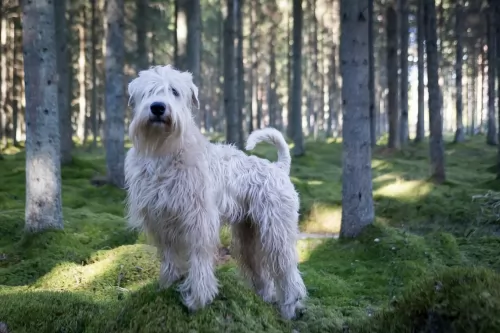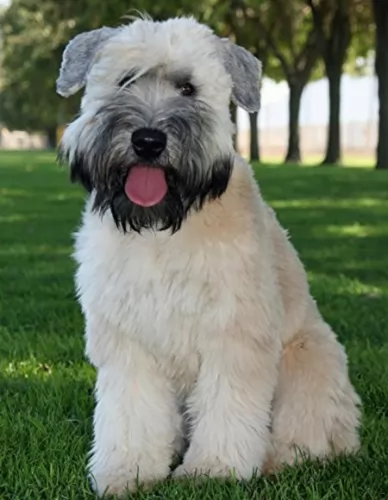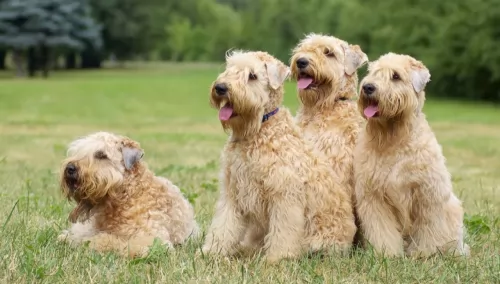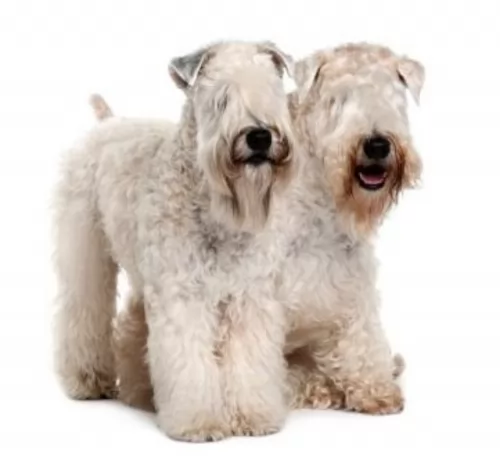 Petzlover
Petzlover Both Bull Terrier and Soft-Coated Wheaten Terrier are originated from United Kingdom. Bull Terrier may grow 11 cm / 5 inches higher than Soft-Coated Wheaten Terrier. Bull Terrier may weigh 9 kg / 20 pounds more than Soft-Coated Wheaten Terrier. Both Bull Terrier and Soft-Coated Wheaten Terrier has almost same life span. Bull Terrier may have more litter size than Soft-Coated Wheaten Terrier. Bull Terrier requires Low Maintenance. But Soft-Coated Wheaten Terrier requires Moderate Maintenance
Both Bull Terrier and Soft-Coated Wheaten Terrier are originated from United Kingdom. Bull Terrier may grow 11 cm / 5 inches higher than Soft-Coated Wheaten Terrier. Bull Terrier may weigh 9 kg / 20 pounds more than Soft-Coated Wheaten Terrier. Both Bull Terrier and Soft-Coated Wheaten Terrier has almost same life span. Bull Terrier may have more litter size than Soft-Coated Wheaten Terrier. Bull Terrier requires Low Maintenance. But Soft-Coated Wheaten Terrier requires Moderate Maintenance
 The Bull Terrier belongs to the Terrier group of dogs and this already tell you that he is highly energetic and that he is essentially intolerant of other pets.
The Bull Terrier belongs to the Terrier group of dogs and this already tell you that he is highly energetic and that he is essentially intolerant of other pets.
They are hunters by nature. The Bull Terrier is known as the Gladiator of the canine world. This breed came about through English breeders of the late 19th century, crossing old fighting dogs which carried Bulldog blood with Terriers. It was in the 1850s that James Hinks of Birmingham in the West Midlands was the first person to standardise breed type for the Bull Terrier. Hinks wanted his dogs to be white, and breeding was designed to achieve this.
Because of medical problems with the all-white dogs, Ted Lyon introduced color, using the Staffordshire Bull Terrier, and these became a separate variety. It is however, the white strain that is famous for pets as well as for show purposes.
 This wheaten colored terrier hails from Ireland. Although the Wheaten has been around for a long time, it was in 1937 that he was recognized as a breed in Ireland.
This wheaten colored terrier hails from Ireland. Although the Wheaten has been around for a long time, it was in 1937 that he was recognized as a breed in Ireland.
The British Kennel Club also recognized the Wheaten and the dog was also exported to the United States. Serious interest started being shown for the Terrier in the 1970s. It was in 1973 that they were recognised by the American Kennel Club.
 The Bull Terrier is a strongly built, muscular dog with a distinctive egg-shaped head. The height of this dog is roughly 53 – 61cm and he weighs in at about 24 – 29kg. He has a short, dense coat which comes in different colors such as white, red, fawn and white or brindle.
The Bull Terrier is a strongly built, muscular dog with a distinctive egg-shaped head. The height of this dog is roughly 53 – 61cm and he weighs in at about 24 – 29kg. He has a short, dense coat which comes in different colors such as white, red, fawn and white or brindle.
The ears are medium sized and erect and the eyes are pig-like, small and dark. The medium length tail is carried slightly upwards.
The Bull Terrier is a determined, strong-willed, stubborn dog and he will require firm handling and training. With socialization and training, he becomes a friendly, loving dog who is good around children.
He tends to be possessive with his human family and their territory, making him aggressive with other pets. Bull Terriers actually have even temperaments and they are good, social dogs with people. He is courageous, brave, full of spirit and character.
 The Wheaten is a medium sized dog standing at between 43 and 50cm and weighing between 13 and 20kg both male and female. The coat of the dog is soft, silky and wavy to even curly and is a wheaten to ginger color.
The Wheaten is a medium sized dog standing at between 43 and 50cm and weighing between 13 and 20kg both male and female. The coat of the dog is soft, silky and wavy to even curly and is a wheaten to ginger color.
The coat of the puppy is dark but as he grows up it changes into the wheaten color although the ears may be a dark brown color. Pet owners like that the Wheaten is a very low shedding dog.
Playful, social and friendly, the Wheaten has always been put to good use on the farm. These days he is pet and companion. He is energetic and playful so children love having him around.
He is slightly more hyper and energetic than other Terrier breeds so will require a good dose of exercise.
He is smart and strong willed, and training and socialization turns him into an amicable pet to have around, so much so that he is sought after as a therapy-dog.
They’re easy-going dogs with no aggression issues but they still make great watch dogs and want to do whatever it takes to look after- and protect their human family.
 The way people bring their dogs up has a lot to do with the way they turn out. The Bull Terrier has often been thought to be a dangerous dog, but this is because of a bad upbringing.
The way people bring their dogs up has a lot to do with the way they turn out. The Bull Terrier has often been thought to be a dangerous dog, but this is because of a bad upbringing.
A dog like the Bull Terrier who has received firm, fair and loving training is an absolute pleasure to have as a pet. Yes, he is a strong willed, stubborn and intelligent dog and he has the make-up to turn out to be a handful. It is perhaps why he isn't the best choice for first-time dog owners who aren’t familiar with the breed and who don’t raise him the right way.
If you choose a Bull Terrier, bring him up correctly, have him trained and socialized and never neglect him and he is guaranteed to become a wonderful, loving family member.
 The Soft Coated Wheaten Terrier has always made an excellent farm dog, but today he is more suited as pet and companion.
The Soft Coated Wheaten Terrier has always made an excellent farm dog, but today he is more suited as pet and companion.
He adapts easily to life in the city or the countryside. Wherever he is, he will need his exercise. He also longs to be an active part of his human family, and then he’s happy, lively, social and friendly and is a great playmate for children.
 Your Bull Terrier is a robust breed, but there are some health issues that you will want to be aware of. For instance, the white Bull Terrier is more prone to deafness than the Brindle or tri-colored Bull Terriers. With good food and lots of love and care, he can reach 14 years of age. However there are one or two ailments what you want to be aware of.
Your Bull Terrier is a robust breed, but there are some health issues that you will want to be aware of. For instance, the white Bull Terrier is more prone to deafness than the Brindle or tri-colored Bull Terriers. With good food and lots of love and care, he can reach 14 years of age. However there are one or two ailments what you want to be aware of.
This is a common orthopedic condition with dogs, affecting both knees and resulting in loss of function and discomfort. Patellar luxation can sometimes come from a traumatic injury to the knee. However, with non-traumatic patellar luxation, the femoral groove for the knee cap is shallow or absent.
Not every variety of skin cancer in dogs is caused by sun exposure, but sun damage to the skin of the pure white Bull Terrier can be a factor. Dogs with white coats are more susceptible to sun damage. Speak to your vet about symptoms so that a physical examination will reveal the reason for sores on the skin.
 When you bring a Wheaten Terrier into your home, you’re not likely to have too many vet fees as he tends to be a healthy dog breed, being able to reach 13, 14 or 15 years of age with good care.
When you bring a Wheaten Terrier into your home, you’re not likely to have too many vet fees as he tends to be a healthy dog breed, being able to reach 13, 14 or 15 years of age with good care.
Look out for a dog ailment known as Protein-losing enteropathy (PLE). This is a condition where the dog isn’t able to properly absorb protein in the digestive tract, so that it is passed in their stools.
It can be fatal, but if caught early, some dietary changes can keep it under control.
Also, look out for inflammatory bowel disease. This disease occurs when the stomach of the dog has a large number of inflammatory cells which can change the lining of the digestive tract, preventing the normal absorption of food.
 The Bull Terrier is a stocky, robust breed and he will need plenty of exercise. He thrives on a good run, long walks and ball games. He is notoriously destructive, so you need to recognize this before you buy such a dog, because simply putting one in your back-yard and ignoring him will make him aggressive and destructive. This is a dog that needs lots of physical as well as mental exercise.
The Bull Terrier is a stocky, robust breed and he will need plenty of exercise. He thrives on a good run, long walks and ball games. He is notoriously destructive, so you need to recognize this before you buy such a dog, because simply putting one in your back-yard and ignoring him will make him aggressive and destructive. This is a dog that needs lots of physical as well as mental exercise.
With the short coat, Bull Terriers are easy to groom, and a brushing twice a week will keep the coat in tip top condition. He will also love the time you spend with him. Shedding of hair with the Bull Terrier is more frequent in the Spring and Fall.
Nail clipping and brushing of teeth are two other grooming routines for your dog. Remember that with teeth brushing, don’t be tempted to use human toothpaste as this can be toxic for your pet. Speak to your vet if in any doubt about how to brush your pet’s teeth.
 Brush your pet’s silky coat twice a week. Such a silky coat can get all tangled and matted. If you prefer, many people opt to rather have the Wheaten’s coat professionally clipped as then it is easier to handle. They like to have the hair clipped that hangs over the dog’s eyes.
Brush your pet’s silky coat twice a week. Such a silky coat can get all tangled and matted. If you prefer, many people opt to rather have the Wheaten’s coat professionally clipped as then it is easier to handle. They like to have the hair clipped that hangs over the dog’s eyes.
Other grooming tasks require you to check inside his ears for redness which could indicate an infection. Trim his nails and check him over for ticks and fleas.
Have your Wheatie trained and socialized as he is a stubborn dog breed and you want him to be well mannered and obedient.
Terriers like this are energetic dogs and he is going to need exercise every day. A walk for a dog is always a welcome experience as it gives him the opportunity to sniff around and pick up new smells. Play ball- or frisbee games with him as this can tire him out a bit.
If your dog shows signs of illness, get him to the vet. He is such a feisty dog that it can be unbearable to see him out of sorts.
Terriers are energetic dogs so if you feed your dog one of the commercial dog foods, make sure the label indicates what food it is. This is because the foods are manufactured according to the type of dog it is, its age, size and energy levels.
Always try and go for the high quality foods which don’t have all those unhealthy ingredients in them. Try to include some home-made food – nothing exotic and spicy – just plain, wholesome food that won’t upset his stomach.
Boiled chicken, brown rice or pasta and spinach, sweet potatoes and carrots is super tasty and nutritious. You can chop it up and add it to your pet’s kibble twice a week.
Try and include a little bit of raw meat to his diet occasionally as this can go towards ensuring he doesn’t get skin diseases. Always ensure he has a constant supply of fresh, cool water available.